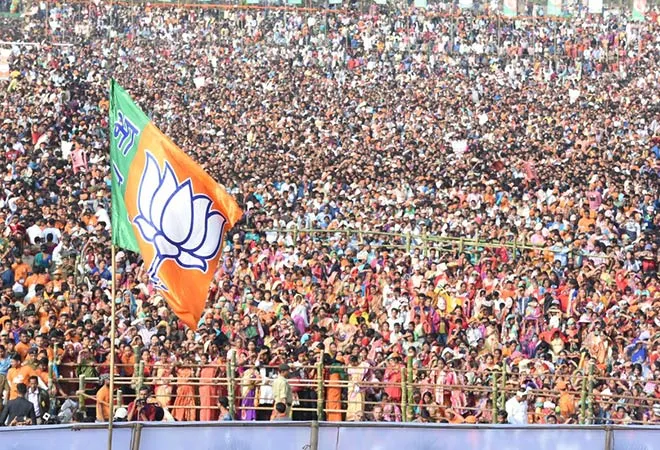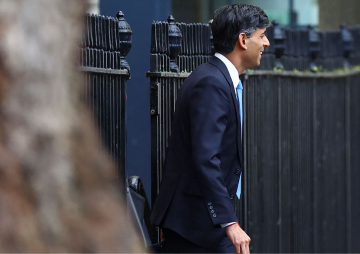
The BJP’s recently released manifesto presents the vision and definition of the Indian nation as outlined by Prime Minister Narendra Modi who has emerged the supreme leader of the party in the last five years.
The 45-page document titled ‘Sankalpit Bharat, Sashakt Bharat’ (Determined India, Strong India), has Modi’s photograph on the cover page, unlike that of the yesteryears when the BJP used to stress upon the concept of collective leadership.
While launching the manifesto, the Prime Minister declared that “nationalism is our inspiration”, outlining the broad contours of the new nation that he with his party propose to build by 2047 when India will celebrate its 100th anniversary of independence from the colonial rule.
In the words of the Prime Minister, it is the resolve of the party to change India from a developing country to a developed country. “We want people to hold us accountable. Hence, we have set out 75 goals to be achieved by 2022” when India completes 75 years of independence, Modi stressed.
In the words of the Prime Minister, it is the resolve of the party to change India from a developing country to a developed country.
The BJP’s nationalism is not soft but muscular that stresses upon national security. The manifesto promises decisive action against terrorism, ending of infiltration by implementing the National Register of Citizens (NRC) in a phased manner, turning into law the Citizens Amendment Bill and the scrapping of 35A that is “an obstacle in the development of the state”.
New nationalism of the ruling party is rooted in the ideological framework of “Hindutva” that clearly positions the BJP as the “Deshbhakt” (nationalist) and the rest, though unstated, as “Deshdrohi” (anti-national).
New nationalism of the ruling party is rooted in the ideological framework of “Hindutva” that clearly positions the BJP as the “Deshbhakt” (nationalist) and the rest, though unstated, as “Deshdrohi” (anti-national).
The manifesto also reinforces the concept by strongly reiterating the party’s core agenda of scraping Article 370, introduction of a Uniform Common Civil Code and construction of Ramjanmbhoomi temple at Ayodhya. At the same time, the party has stated that it would be its “endeavour to secure Constitutional protection on issues of faith and belief”. The new dimension has been added not only to show the BJP’s commitment to Ram temple but also to expand its political territory in Kerala through the issue of allowing women of all ages to enter the Sabirmala temple. The document, following its core ideology, vows to eliminate triple talaq and nikah halala.
The document starts with a section ‘Nation First’, highlighting the “decisive leadership” of Modi that “fundamentally altered the national security paradigm of India in the last five years”. The first section lists zero-tolerance to terrorism, strengthening of armed forces, self-reliance in the defence sector, welfare of soldiers and reinforcing border security.
Finance Minister Arun Jaitley further elaborated the party’s understanding of nationalism when he defined the national security doctrine of the BJP-led government that strongly rejects “ideas of Balkanisation of India”, saying that it had been done by “Tukde Tukde” mind-set (a reference to ultra-left) and “Ivy leaguers”.
Other strands that dominate the document are about rural India and the building of infrastructure. While sharing its vision to make India a $5 trillion economy by 2025 and the third largest economy of the world by 2030, the manifesto has promised to invest an amount of 100 lakh crore to develop the infrastructure of the country. The document has also promised to build “next generation” infrastructure, including gas and water grids, regional airports and wayside amenities along national highways.
While sharing its vision to make India a $5 trillion economy by 2025 and the third largest economy of the world by 2030, the manifesto has promised to invest an amount of 100 lakh crore to develop the infrastructure of the country.
The manifesto also promises to launch a set of initiatives that include ‘Jal Jivan Mission” under which a special programme – “Nal se Jal- will be introduced to ensure piped water for every household by 2024. At the same time, the Bharatmala 2.0 project will support States to develop road networks connecting the interior regions to the main roads and “effectively leverage the economic potential and market opportunities of the region concerned.
The manifesto rightly talks about boosting exports and helping small and medium entrepreneurs along with their enterprises but fails to present concrete ideas as to how the party will go about it. Absence of roadmap to make this section of enterprises competitive in global environment that have undergone tough and turbulent times in the last few years is glaring.
Another noteworthy omission is about jobs and employment. At a time when unemployment is at the highest level of the last 45 years despite the refusal of the government to accept the NSSO’s leaked data, skipping such a vital issue exposes the ruling party to opposition attacks.
Absence of road-map to make this section of enterprises competitive in global environment that have undergone tough and turbulent times in the last few years is glaring.
The BJP, wanting to counter the Congress’ promise of minimum income to poorest of families, has also promised pension to small and marginal traders along with marginal farmers. The manifesto has also promised to make farm loans up to Rs 1 lakh interest free for five years and to invest Rs 25 lakh crores in the agriculture sector. It also promises to double farmers’ income by 2022, without giving details how it would be achieved. The BJP, if voted to power again, has promised to build 1.25 lakh new health centres.
The manifesto, falling short on some of the daunting issues like joblessness, does not evoke Acche Din sentiments. It chooses to mobilise popular support through non-quantifiable issues that arouse emotions by invoking nationalism and taps human fear of national security.
The views expressed above belong to the author(s). ORF research and analyses now available on Telegram! Click here to access our curated content — blogs, longforms and interviews.




 PREV
PREV


